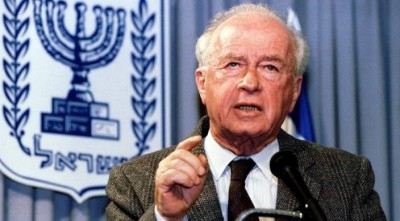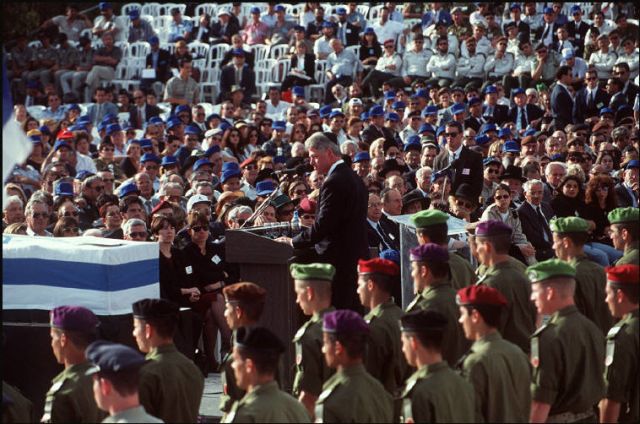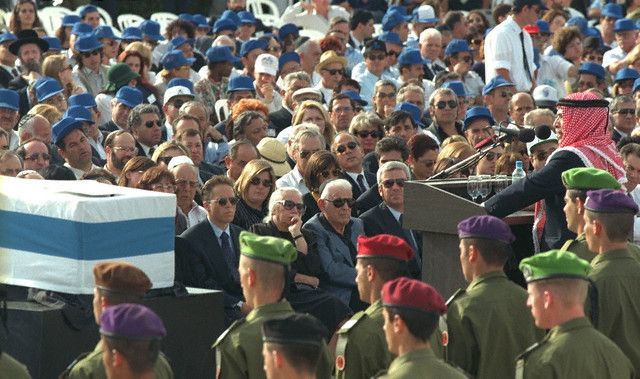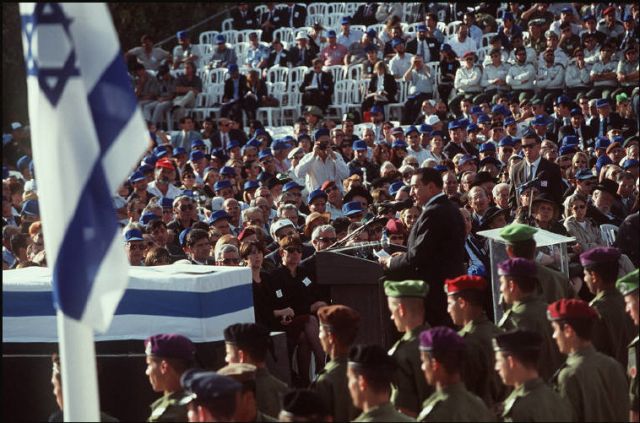Flashback to 1995: The U.S.-Israel-Turkey-Jordan-Egypt Alliance at Prime Minister Rabin’s Funeral


U.S. President Bill Clinton gives a eulogy at the funeral of the assassinated Israeli Prime Minister Yitzhak Rabin, Mount Herzl, Jerusalem, 6 November 1995
Eulogy for the Late Prime Minister and Defense Minister Yitzhak Rabin by U.S. President Bill Clinton
Israel Ministry of Foreign Affairs website, 6 November 1995

Jordan’s King Hussein gives a eulogy at the funeral of the assassinated Israeli Prime Minister Yitzhak Rabin, Mount Herzl, Jerusalem, 6 November 1995
Eulogy for the Late Prime Minister and Defense Yitzhak Rabin by His Majesty King Hussein of Jordan
Israel Ministry of Foreign Affairs website, 6 November 1995

Egypt’s President Hosni Mubarak gives a eulogy at the funeral of the assassinated Israeli Prime Minister Yitzhak Rabin, Mount Herzl, Jerusalem, 6 November 1995
Eulogy for the Late Prime Minister and Defense Yitzhak Rabin by Egyptian President Hosni Mubarak
Israel Ministry of Foreign Affairs website, 6 November 1995
[emphasis added]
Excerpts from: With blessing of U.S., Israel draws closer to Turkey and Jordan – Eyes on post-Saddam Iraq
by Amy Dockser Marcus, Wall Street Journal, 30 May 1996
After attending funeral services for assassinated Israeli Prime Minister Yitzhak Rabin in November [1995], U.S. President Bill Clinton held an impromptu meeting in […] [King David Hotel in Jerusalem]. Among those in attendance were acting Israeli Prime Minister Shimon Peres, King Hussein of Jordan […] then-Prime Minister Tansu Ciller of Turkey […] [and] Egyptian President Hosni Mubarak […]
Few realized it at the time, but the Israeli television cameras that panned the room for the nightly newscast were offering the first glimpse of a new strategic alignment in the Middle East. Six months later, both the promise of that picture and the complications that go with it are increasingly apparent. […] Martin Indyk, the U.S. ambassador to Israel, says Turkey, Israel, Jordan and Egypt share the “common thread” of threats from terrorism and the prospect of rogue states [i.e. Iran, Iraq, Libya, Syria] possessing weapons of mass destruction. […]
Israel and Turkey have signed agreements calling for everything from free trade between the two countries to joint air-force training, naval visits and intelligence sharing. [1] […] This month, eight Israeli F-16 jets began training in Turkish air space. […] Turkish-Israeli naval maneuvers in the Mediterranean Sea are planned for next month, and a joint mid-air refueling exercise has already been conducted [at NATO’s Incirlik Airbase in southern Turkey [2] ]. According to Turkish and Israeli officials familiar with the [February 1996 military cooperation] agreement, Turkey will also allow Israel to gather intelligence on Syria and Iran from Turkish soil, and Israel will help with training in preventing infiltration of [PKK] terrorists across Turkey’s border [with Syria, Iraq and Iran]. […]
For the first time, U.S. warplanes in March [1996] began using a Jordanian air base from which to fly daily sorties over [the no-fly zone in] southern Iraq. […] U.S. officials say Jordan’s military cooperation has also led to a change in the Clinton administration’s “dual containment” policy, which calls for keeping both Iran and Iraq weak but making no intensive effort to overthrow either regime. Now the U.S. is employing an enhanced version, says one official, a kind of dual containment with teeth. “We’re stepping up the pressure on Saddam,” this official says. “And we’re only able to do that because Jordan has now joined the anti-Iraq camp.” […] It is of critical importance to the U.S., Turkey, Jordan and Israel that post-Saddam Iraq doesn’t ally itself with more radical states such as Syria, Iran or Libya. […]
[1] The list below indicates that an overt military cooperation between Israel and Turkey was actually put into practice even before Yitzhak Rabin began his second term as a prime minister in July 1992:
April 1992: […] [Israel and Turkey’s] defense ministries sign a document on principles for [defense] cooperation.
November 1993: […] [Israel and Turkey] sign a memorandum of understanding creating joint committees of senior officials to handle regional threats such as terrorism and fundamentalism. The countries agree to cooperate in gathering intelligence on Syria, Iran, and Iraq and to meet regularly to share assessments pertaining to terrorism and military capabilities in these three countries. Turkish foreign minister Hikmet Cetin visits Israel, the first visit ever by a Turkish foreign minister.
January 1994: Israeli president Ezer Weizman visits Turkey, the first official visit ever by an Israeli head of state.
May 1994: A Security and Secrecy Agreement is signed, guaranteeing secrecy in the exchange and sharing of information between […] [Israel and Turkey].
October 1994: Israeli director of security Asaf Haffetz visits Turkey. The April 1992 protocol on defense cooperation is embellished and solidified. Specific areas for military cooperation are delineated.
November 1994: Turkish prime minister Tansu Ciller visits Israel, the first official visit by a Turkish prime minister. The two nations’ police forces reach an agreement on cooperation over the exchange of
information. [3]
September 1995: Leaders of both countries sign a memorandum of understanding for the training ofpilots in each other’s airspace.
November 1995: Israeli naval commander Adm. Ami Ayalon visits Turkey. [4]
source: Timeline of Turkish-Israeli Relations, 1949–2006, by Brock Dahl and Danielle Slutzky, Washington Institute for Near East Policy (WINEP), 2006
[2] source: Syria fears Israeli-Turkish joint air maneuvers and intelligence, by Leslie Susser, Jerusalem Report, 2 May 1996
[3] [At the state dinner held by Israeli Prime Minister Yitzhak Rabin in honour of Turkey’s Prime Minister Tansu Ciller at King David Hotel on November 3, 1994], Mrs Ciller told her hosts, “I can assure you that you will have your promised land!” […] The Israelis’ “promised land” extends from the Nile to the Euphrates, and takes in Turkish territory!
(source: ‘Turkey likely to launch “American style” strikes against Syria and Lebanon’s Bekaa’, Mideast Mirror, 16 October 1998. Note: hyperlink added)
[4] Commander of the Israeli Navy Ami Ayalon returned from Ankara on the eve of Israeli Prime Minister Yitzhak Rabin’s assassination.
From the archives:
“Greater Israel”: The Zionist Plan for the Middle East – The Infamous “Oded Yinon Plan”
[“A Strategy for Israel in the Nineteen Eighties” article by Oded Yinon, 1982]
by Israel Shahak, Global Research, 6 September 2015
A Zionist in disguise: Prime Minister Erdogan’s phony anti-Israel rhetoric
by Cem Ertür, Indybay, 30 November 2012
by Mahdi Darius Nazemroaya, Global Research, 26 November 2011
A Clean Break: A New Strategy for Securing the Realm
[report by Institute for Advanced Strategic and Political Studies, June 1996]
Information Clearing House

